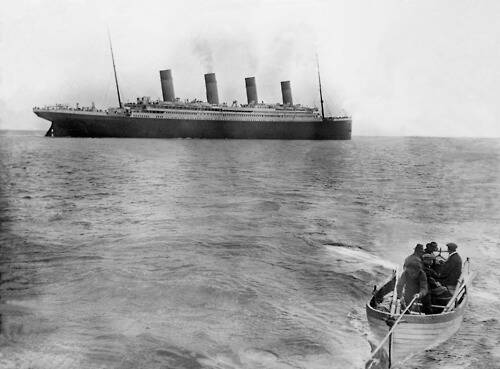This blog post, on the anniversary of the sinking of the Titanic, was posted in April of last year. Today is the 101th anniversary of the sinking:
In April of 1912, America had just celebrated its third year of publication. Today we have reposted the editorial that appeared in our issue of April 27, 1912, entitled "The Titanic Disaster," which may prove a moving entree into those days, as well as a surprise to readers today. (That image of the great ship, by the way, was taken by Frank Browne, SJ, who left the boat midway through its maiden voyage.)
The editorial's opening lines would probably be at home (with the exception of the use of "man" for "humanity") in most journals of opinion and newspapers (and blogs) today: "The total loss of the greatest ship that man has built with its burden of 1,500 lives has appalled and saddened the world. The Titanic represented the acme of human foresight and scientific accomplishment." And the observation "Most of the victims were men; they died like men" also will not astonish, given most people's understandings of the era's sensibilities. Neither will archaic words or phrases like the "lightnings of heaven" or God's "argosies."
Two things, however, may be of surprise to current-day readers. First is the placement of the article. Given the magnitude of the tragedy, one would expect it to be the lead editorial. Rather, it comes after a lighthearted congratulatory announcement of the 70th birthday of Cardinal John Farley, the archbishop of New York. (To put that in perspective, imagine if our editorial commenting on the tragedy of Sept. 11, 2001 had followed our congratulating Cardinal Edward Egan on his jubilee.)
Readers will also note the distinctive Catholic spirituality of the time. Not surprisingly, the article in "America: A Catholic Review of the Week" focuses on the "Catholic angle," including the presence of two priests aboard "to absolve and bless." But the editors also note that for some on board the disaster would have been "a blessing." Why? "The crash of instant overwhelming peril often shocks the dormant, sin-sodden faculties of the soul into a vivid sense of its duties and its danger, opening it to grace and faith, and compelling the cry that bringeth mercy. Many of the Titanic's victims probably went down to death with a faith and penitence that the uneventful routine of life would never invoke, and for such the disaster was a blessing."
It is always dangerous to judge the spiritual perspectives of those in the past, where as the saying goes, it is different country. And who knows how our editorials will read in another century? (For the record, though, I would have struck that last line.) We join America's editorial board of 1912 in their prayer for those lost on the R.M.S. Titanic that, as the editorial of April 27, 1912 concluded, they may have already entered into the fullness of God's presence, and that they may await the resurrection, "when the sea shall give up its dead."
James Martin, SJ








